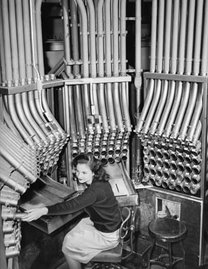Republicans: the party that wrecked America
They need to be branded with this every day between now and the election. Republicans: the party that wrecked America.
It turns out the real hurricane blew through Wall Street last week, not Galveston. This morning, Manhattan is strewn chest-deep with the debris of banking and at this hour (seven a.m.) nobody knows how far, deep, and wide the damage will spread. The fear, of course, is that we are witnessing a classic "house-of-cards" or "dominos-in-a-row," situation, and that the death of Lehman Brothers and Merrill Lynch will cascade into a generalized collapse of the entire consensus of value that supports mediums of exchange.John McCain wants us to believe that he will fix the problem:
At least one thing ought to be clear: this has happened due to the negligence and misfeasance of the regulating authorities, namely the Republican Party, and that now all the hoopla surrounding Sarah Palin can be swept away revealing that group to be what they actually are: the party that wrecked America.
[...]
Some group of somebodies will have to clean up this mess. Moving toward a major election, it is hard to imagine the American people giving the clean-up task to the very group that created the mess -- no matter how many cute little faces Sarah Palin can make on TV. Both parties have so far managed to ignore the gathering crisis of banking and money, but they can't ignore the sequoia trees crashing down around their ankles and shaking the earth they stand on.
At issue now will be the question of legitimacy in all its human social dimensions. Is our money legitimate? Is the authority of our elected officials legitimate? Are our values and ideas legitimate? These are the things that will determine what kind of future we find ourselves in.
"We will never put America in this position again. We will clean up Wall Street. This is a failure."However, let's remember who enabled this and how it was done.
Given that today John McCain once again said that the "fundamentals of the economy are strong," I think it's clear that he doesn't even recognize that there is a problem. His campaign is being run by lobbyists, but he wants us to believe that he'll be a reformer? I simply cannot understand why anyone who isn't filthy rich supports this guy. Given what happened today, I can't see why even wealthy people support him.If McCain wants to hold someone accountable for the failure in transparency and accountability that led to the current calamity, he should turn to his good friend and adviser, Phil Gramm.
As Mother Jones reported in June, eight years ago, Gramm, then a Republican senator chairing the Senate banking committee, slipped a 262-page bill into a gargantuan, must-pass spending measure. Gramm's legislation, written with the help of financial industry lobbyists, essentially removed newfangled financial products called swaps from any regulation. Credit default swaps are basically insurance policies that cover the losses on investments, and they have been at the heart of the subprime meltdown because they have enabled large financial institutions to turn risky loans into risky securities that could be packaged and sold to other institutions.
Lehman's collapse threatens the financial markets because of swaps. From Bloomberg:
Bond-default risk soared worldwide as the collapse of Lehman Brothers Holdings Inc. sparked concern than the $62 trillion credit-derivatives market will unravel....Lehman, the fourth-largest securities firm until last week, has been one of the 10 largest counterparties in the market for credit-default swaps, according to a 2007 report by Fitch Ratings. The market, which is unregulated and has no central exchange where prices are disclosed, has been the fastest-growing type of so-called over-the-counter derivative, according to the Bank for International Settlements."The immediate problem is the derivative default swaps market, in which a plethora of institutional accounts and dealer accounts are at risk,'' Bill Gross, manager of the world's largest bond fund at Pacific Investment Management Co. in Newport Beach, California, said in an interview with Bloomberg Radio yesterday. "It induces a tremendous amount of volatility and uncertainty.''Barclays Capital analysts have estimated that if a financial institution with $2 trillion in credit-default swap trades were to fail, it might trigger between $36 billion and $47 billion in losses for institutions that traded with the firm. So the Lehman fiasco--caused in part by the use of unregulated swaps--could lead to ruin elsewhere in the economy.
Gramm is responsible for the rise of the wild and woolly $62 trillion swaps market. And he was chairman of the McCain campaign and a top economic adviser for McCain--until he dismissed Americans worried about the economy as "whiners." After that comment, McCain dumped Gramm. But was Gramm truly excommunicated from McCain land? Last month, he attended a meeting of McCain's top supporters in Aspen, Colorado. And at a dinner that day, McCain singled out Gramm for praise. Last week, failed Republican presidential candidate Ron Paul revealed that Gramm, now an exec for Swiss banking giant UBS (which also lost billions of dollars due to subprime loans and swaps), had recently called him as part of a McCain effort to win Paul's endorsement. Paul turned Gramm down.




No comments:
Post a Comment